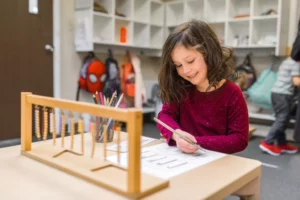Montessori is no longer limited to the classroom. It is entirely possible to use a Montessori parenting approach in your home. How to Incorporate Montessori Education into Your Parenting? It is one of the common questions parents ask. You’ll find ten strategies to incorporate Montessori into your parenting in this post. Learn how you may plant the seeds of Montessori in the world by raising your kid the Montessori way, from respect to discipline.
You may have heard the distinction between Montessori as educational pedagogy and Montessori as a way of life. True, your home will never be able to function as a Montessori school, nor should it. However, there are other ways to incorporate the Montessori philosophy into your parenting and home.
10 Ways to Bring Montessori into Your Parenting
#1 Following your child’s lead is a good idea.
It is one of the ways to bring Montessori into your parenting. A basic Montessori precept is to “follow the kid.” If you’re not aware of the expression, it implies that you should let your child show you what they need for their growth and then allow them to meet those requirements. It can be difficult to follow your child’s lead. It is, however, much easier in a properly prepared atmosphere.
Maintaining an open and attractive playroom that is clean and well-stocked with accessible toys, “work” materials, books, and gross motor activities will help you figure out what your kid enjoys so you can follow their lead.
#2 Keep an eye out for important periods.

There will be times in your child’s development when they are eager to learn a new skill. Sensitive Periods are what they’re called. Dr. Montessori thought that we should attempt to accommodate and facilitate the urges that children have during these times. Weaning, movement, language, and potty learning are just a few of the sensitive periods to watch for.
#3 Observe.
Observation is essential for efficiently following your child’s lead and keeping an eye on sensitive developmental stages. Observing in Montessori is more than just watching. You must examine your child objectively to observe them properly.
Here is an example. If you notice your child putting their peg doll family in a basket and transporting them about the home, you could assume that they adore them. And this may turn out to be the case.
If you’re paying attention, you could notice that your child puts some of their stuffed animals in a cart and pushes it about the house later in the day. Your kid may be stuck in the transportation schema. You now have a better grasp of their conduct and can follow up on some of their requirements- that you might have otherwise neglected by taking an objective look at their behavior.
Are they keeping track of what they’re transporting? Then they can be going through a difficult time with math. This is just an example, but it should give you a sense of the type of knowledge that may be gleaned via actual observation.
#4 Discipline
The term “discipline” can irritate even the most gentle of parents. Because of the word’s common usage, it might conjure up images of many sorts of punishment. But it’s not a horrible word. And it doesn’t have to be in the form of punishments. We use a notion of discipline in Montessori that refers to exercises that lead to self-control. You should utilize a blend of natural and rational consequences while pursuing Montessori parenting. You can obtain a wonderful explanation if you click on the link in the preceding phrase.
Here’s an example of both natural and logical consequences in a nutshell:
Natural
Your child spills their meal on the floor. They are hungry because they don’t have any food on their table. They discovered that throwing their food means they can not eat it.
Logical
Your child spills their meal on the floor. You invite them to help you acquire materials and clean up the mess. They discovered that food that had been thrown on the floor had to be cleaned up.
In this case, both of these examples are entirely compassionate and Montessori-aligned ways of dealing with discipline. When using a Montessori parenting approach, keep in mind that the ultimate purpose of discipline is the development of self-control. Punishments do not achieve this purpose; natural and logical consequences do.
#5 Take a step back
Our children’s safety is always a top priority, but staying too near to them too much can deprive them of crucial learning opportunities. Allowing your child to take age-appropriate risks aids in the development of problem-solving skills and has been linked to improved mental health in adults. Do you recall bullet point 4? Your child requires some room to try new things, take healthy risks, and learn from their failures.
#6 Use effective praise
You’ve probably heard that saying “good work” isn’t always the best option. But why is this the case? The idea for avoiding phrases like “excellent work” is that they focus on the product rather than the process. Praise for a child’s final product deprives them of opportunities to develop intrinsic motivation.
As an example, your child constructs a block tower. “Wow, that’s an incredible tower!” you exclaim. You’re a natural builder!” In this case, you complimented the completed skyscraper and concluded by setting high expectations for their future work.
A different example:
Your child builds a tower out of blocks. “I watched you working so hard on that!” you say. You ought to be pleased with yourself!”
You commended their effort and the wonderful feeling they acquired from working hard in this case.
If you’re trying to implement a Montessori approach to raising your child, the difference between these two instances should provide you with a good starting point.
#7 Instill emotional intelligence in your students.
Because of its intellectual ideas, Montessori is particularly appealing to many parents. Emotional intelligence is as important and respected as Montessori. One of the most significant and straightforward methods for parents and caregivers to incorporate Montessori into their homes is through this method.

Here are some examples of how emotional intelligence can be taught:
- Describe your emotions
- Recognize and talk about your emotions
- Cultivate empathy
- Co-regulate and provide self-regulation strategies
#8 Allow freedom, while keeping limits
Setting consistent limits for your child ensures that they feel safe and comfortable, as it demonstrates that you are there to take charge of a situation if necessary. Consistent and sensible limitations are beneficial to children. Teachers in Montessori schools allow as much independence as possible while protecting the safety and emotional well-being of the children.
#9 Respect Your Kids
For many parents and caregivers, this is a difficult notion to grasp. “Children should be seen and not heard,” many of us were taught as children.
However, this old way of thinking has been exposed as being destructive. As the saying goes, “know better, do better.”
A Montessori concept is that children should be respected. But what does it mean to appreciate a child?
Here are some examples of how you should appreciate your child:
- Pay attention to what they say and how they say it;
- Appreciate their words by incorporating them into daily activities and family interactions.
- Ask for their permission before speaking about them as if they don’t understand you or aren’t in the room.
- speak to them and softly touch them
- When feasible, allow for natural consequences – give them the space they need to learn.
- expressing gratitude for the pleasant things they do
- When feasible, stroll at their pace rather than rushing them.
- Take them as they are and accept them for who they are.
#10 Model the Right Behaviors
The phrase “do as I say, not as I do” should never be used to parenting. This is because children are built to emulate our actions. Children gain practical skills, social skills, and emotional coping mechanisms through imitating adults.
Do you want your youngster to take a few deep breaths if he or she is frustrated or overwhelmed? When you’re feeling those emotions, take a few deep breaths. Tell your kid how you’re feeling and what appropriate coping methods you’re employing to deal with your emotions. You will be serving your child well when you apply this concept to your interactions with your child and other people.
Takeaway:
Montessori isn’t just for the classroom, as you can see. You will be well on your way to Montessori-style parenting if you apply these ten guidelines to your parenting. Follow the different points mentioned above to bring Montessori into your parenting. Today many parents opt for Montessori education for their kids. Thus, it would be great to choose the best Montessori school for your kid.










